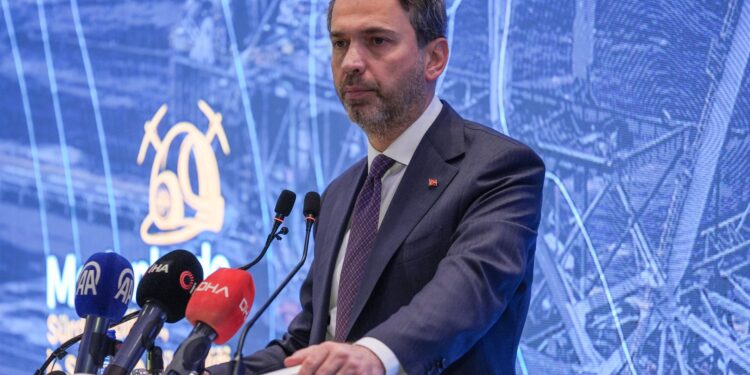Somalia has announced that Turkey is set to commence oil drilling along the country’s extensive coastline in the upcoming year, as confirmed by Mohamed Hashi Abdi ‘Arabey’, the Director General of the Somali Ministry of Petroleum and Mineral Resources.
According to the East African, Abdi confirmed the recent assertion by a Turkish official on a plan for a deep-sea oil operation by 2025.
“It is correct, and it is part of the agreement we reached (with Turkey). They will begin seismic works and drilling at the coasts facing Barawe and Hobbio districts,” Abdi said agreeing with the information made public by Turkey’s Energy and Natural Resources Minister Alparslan Bayraktar last week.
At the beginning of March, Somalia entered into a fresh agreement with Turkey regarding oil and gas. This deal, according to officials from both nations, is expected to enhance collaboration in the exploration and utilization of petroleum resources.
The signing ceremony took place in Istanbul, where Somalia’s Petroleum and Mineral Resources representative, Abdirisaaq Omar Mohamed, and Turkish Energy Minister, Alparslan Bayraktar, put pen to paper.
Somalia’s Minister Omar Mohamed, who endorsed the exploration and exploitation agreement, elaborated on the bilateral understanding between the two countries, outlining a comprehensive cooperation framework.
A formal communication from the Somalian government highlighted the focus of the agreement on hydrocarbon reserves within Somalia’s exclusive economic zone while providing limited details on the revenue-sharing mechanism for the investment.
The minister further indicated that revenue sharing will emerge when the parties reach a stage to sign a Production Share Agreement (PSA).
The Turkish energy minister asserted that the agreement would yield greater advantages for both the government and the citizens of Somalia.
With this agreement, we will carry out joint activities to bring the resources of Somalia to the Somali people,” remarked the Turkish minister.
He further explained that Turkey seeks to establish its presence in the Horn of Africa with new deals in the field of energy.
What To Know
- In 2020, Somali President Mohamed Abdullahi Farmaajo signed the Somali Petroleum Law. The law was designed to ensure that Somalia’s petroleum resources are maximized for the benefit of the Somali people while establishing a robust framework for governance.
- Records show that international oil companies including Chevron, Eni, ExxonMobil, and Shell began exploring Somalia in the 1950s but stopped when the country plunged into civil war in early 1991.
- Reports in October 2022 show that Somalia President Hassan Sheikh Mohamud supported Coastline’s Production Sharing Agreements with the Federal Government and declared the country was open for business with international companies.
What’s The Scope Of The Relationship Between Turkey And Somalia?
Turkey’s entry into Somalia in 2011 started as a humanitarian partnership but soon turned into a strategic one. Its support since has been economic and infrastructural and has increasingly included the military.
The Turkish government saw Somalia’s failed statehood and the lack of other major international stakeholders as an opportunity to increase its popularity across Africa.
Turkey aimed to:
- gain international visibility
- test its ability to intervene in the conflict and post-conflict scenarios
- increase market diversification into East Africa
- cultivate its image as a benevolent Muslim middle power by promoting Islamic solidarity.
Several Turkish faith-based associations and NGOs already active in Africa became directly involved in development and relief projects. Major national brands, such as Turkish Airlines, promoted campaigns to raise funds for Somalia.
Within a few years, Turkey’s involvement in Somalia was portrayed by the government and perceived by the Turkish public as a domestic issue.
Turkey’s early efforts to bring Somalia back to the table of the international community were successful.
With the reopening of Mogadishu’s port and airport in 2014, both managed by Turkish companies, the economic situation in Somalia improved compared to the previous decade. Turkish political elites began to present their involvement in Somalia as a success story. This is despite some remaining critical problems, including failing to root out the terrorist organization Al-Shabaab.
Turkey took responsibility for training the Somali National Army in partnership with other stakeholders, including the European Union and the United States. It opened a military base in Mogadishu in 2017. The base trains one of the army’s elite units, the Gorgor Brigades, and serves as a Turkish military outpost in the region.
Al-Shabaab’s persistence has convinced Turkey that it needs to provide more active military support for Somalia’s development. Ankara also wants to protect its economic and political investments in Somalia.
Finally, behind the Turkish deal with Somalia is the politics around the North Atlantic Treaty Organization (NATO).
Over the past 12 months, Turkey has moved closer to the United States. It’s positioned itself as an effective ally in Africa to counteract the negative effects of France’s withdrawal – such as the increasing influence of Russia. Turkey’s commitment to Somalia follows its efforts in Libya.
In both cases, Turkey has proven willing to take on the security burden that other Nato members, particularly Italy, have refused to meet.
Turkey’s engagement in Somalia is, therefore, part of a broader foreign policy strategy to gain more autonomy in global politics. Increased relevance within Nato would help achieve thi










